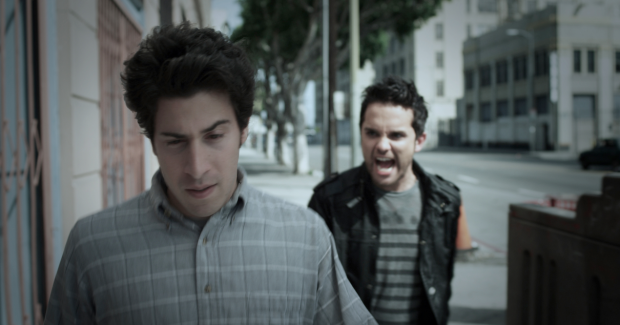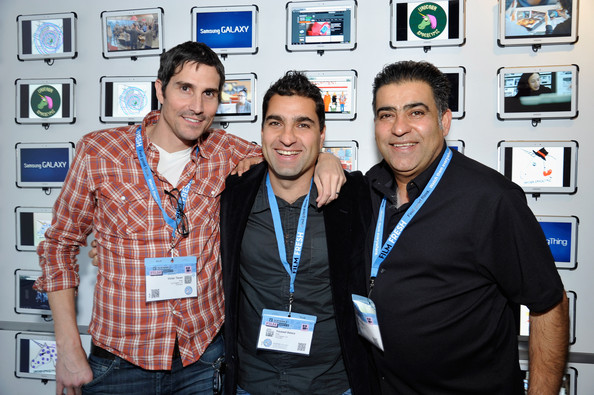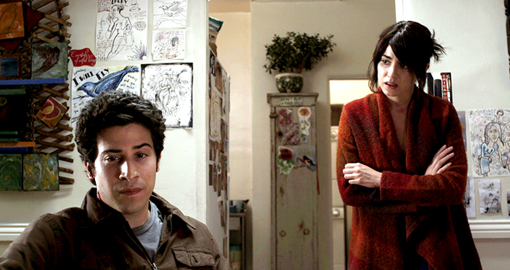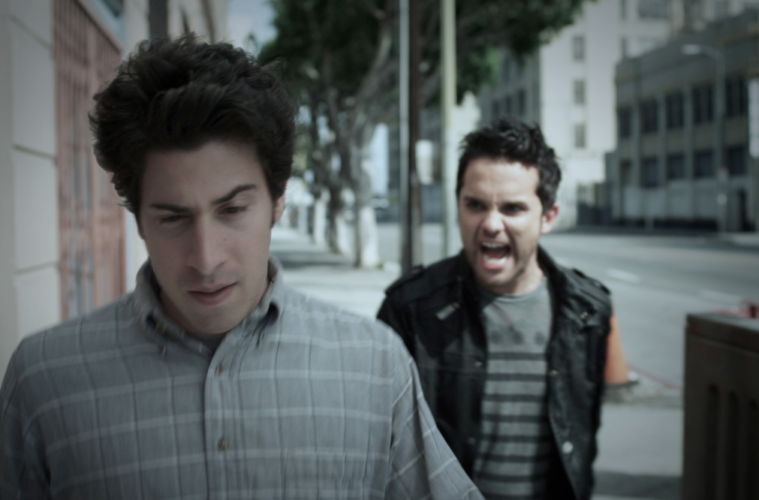
A film like Snap is bound to garner strong reactions. I personally felt conflicted after attending the South By Southwest Film Festival premiere, but over the time I took to digest it, I liked what it did more and more. In my review I said, “Snap is akin to the themes it explores: it’s messy, shocking, and powerful.” That seemed to be the intention of directors Youssef Delara and Victor Teran, so mission accomplished.
While at SXSW I had a chance to talk with the two directors and one of the film’s stars, Thomas Dekker, after a screening. Together we talked about the score from Reza and whether they thought about going away from electronica at any point, if any roles expanded once they got on set, why the 90 minute film seems to be so common, and even SXSW. I must warn you now, we didn’t hold back and have some spoilers towards the end, but I tagged them so you know when they begin. Check out our conversation below.
Whether you want to call it dubstep or you want to call it electronica, music is heavily featured in this film. How cool is it to come into an environment like this, one so heavily focused on music as well?
Youssef Delara: Yeah, when we got the news we just breathed a sigh of relief because our dream was to open, you know premiere, here [at SXSW] for that reason. It’s a festival that understands genre and it’s a festival that obviously understands music, and our film features a genre vibe with a ton of music. [SXSW] is something (that we feel as) more youth based; it definitely skews younger. So we really wanted to be the young, hip, cool, music film festival and there is no other young, hip, cool, music film festival in the United States. Even in Toronto we were like, “We just hope this happens.”
If I’m not mistaken, it’s nothing but electronica throughout the film correct? So how much did you maybe have discussions with the composer [Reza Safinia] where you said, “Let’s break away from it a just a little bit, let’s have a normal kind of moment in here,” or things like that? Were you pretty much full force always to have that throughout the film?
YD: Well there’s different types; there’s dubstep,, there’s some drum and bass in there. So within the world of electronica you can break it up into various subgenres that we felt worked for various moments in the movie, but outside of that there’s a huge sound stage that the film has with music and sound and the voices in his head. All of that played such a huge part in the movie that it was never like a directed, “it has to be this,” it just evolved to this. We thought if he is a musician the music of the movie is going to be his music and the music of the world is going to be derived from that. So that was sort of our base and everything sort of filtered throughout that.
 It seems like the 90 minute movie is kind of like this sweet spot for a lot of independent films, and certainly here. Is that what you were shooting for? Did it just naturally work like that?
It seems like the 90 minute movie is kind of like this sweet spot for a lot of independent films, and certainly here. Is that what you were shooting for? Did it just naturally work like that?
Thomas Dekker: This was originally a 148 minute long film. The first hour was just me naked singing karaoke and then they cut it at the last minute. I don’t know why they did that. Now we’re at 90 minutes. Too much? I think it was.
[All laugh]
Victor Teran: I wouldn’t say we were aiming at any length. When we start with a script I think, maybe it’s just the stories that we’ve chosen to tell up to this point, we’ve never gone to battle with a script that was much over 100 pages because that seems like that is the sweet spot in terms of a script that’s doable usually on the schedules that we’re doing, and that isn’t going to end up with a three hour long first cut. Earlier in my career I worked on movies, bigger movies, that had 115-120 page scripts, you really have to dwindle it down from three hours, the first cut. That’s great if you can afford it, to have that much to play with but most similar movies don’t. You really have to pick and choose what you’re going to battle with and just keep it tight.
YD: Especially a thriller. You want it to be taut.
VT: We stripped a lot away. We kept it as lean as possible.
When you initially come up with the ideal character or the ideal actor that you want in these individual roles, and then you actually go out and cast them, do you get to set and expand any roles?
YD It’s very apropo that the one person who we knew was the right part. Across the board, all our four main actors from Nikki to Jake to Thomas to Scott, as soon as we met them we’re like, “That’s it,” it was instinct. But Thomas’s level of acting and his aversion was so powerful and so provocative and interesting to us as filmmakers; we tried to stick him into as many scenes as we could. We actually brainstormed a scene we made in the movie and just threw him out there in the street and said, “A, B go!”
VT: Originally the script was a turning point that, once he got in his head he stayed in his head. We wanted this to be a thing where it was happening in stages, where it was sort of counter intuitively: the further outside of him he was the more severe the delusion was for the audience. You know what I mean? So inside he seemed like a real person, but in that way he’s more disconnected from Jim and his being. As he burrows further in, he starts to fade away as his own thing and really becomes a voice deep inside his head. So that was the original perception of it, so by half way or ¾ way point, the Thomas character was lost. Not lost in the script, because he was still there as a voice, but it was like he was gone, and we realized that we had to break our own rule a little bit and figure out how to do it cleverly because he was too good. And we really felt it was going to become a liability if we lost him because the audience would really feel like they were missing him.
TD: That’s a very nice compliment.
Are you going to be able to enjoy the festival?
TD: I leave tomorrow.
You have to leave tomorrow?
TD: But I managed to go to the greatest party I’ve ever been to while I was here. I went to the Spring Breakers after party and that was outrageous. So that’s a good memory.
YD: Yeah we definitely have some memories. We also have tonight. We’re planning to make some memories tonight as well.
 *Spoilers from here on.*
*Spoilers from here on.*
I noticed the voices in the head (the characters of the voices in the head) don’t interact with any objects. They don’t get their own coffee, they don’t talk to other people, and they don’t touch other people.
TD: I touched that door by accident.
So you all were aware? Originally you kind of bumped into the door and it moved?
TD: Yeah, I grabbed it the first day and you were like, “Don’t do that.” That’s just how much these guys pay attention which is amazing.
So you all were definitely aware of that?
VD: At first we set up some very strict rules for ourselves, where we didn’t even want to give the alter egos coverage. We just wanted to always maintain, if they were going to be in the frame it was within the other person’s frame. They never got to have their own coverage and in the movie you really see that even though there’s a couple, I guess cheats.
TD: They have one shot and it’s in the hallway isn’t it?
YD: Yes! There’s a few.
TD: That’s a shock to his brain. That’s a flash.
Coming out here and having these back to back screenings, is it interesting to gauge the audience’s reaction? Were you all sitting in the theater? Are you just soaking up the audience’s reaction?
YD: I was. Yea, you’re part ok and part terrified when they shift in their seats or if someone has to get up to go to the bathroom, you hope they’ll come back and they’re not leaving your movie. There’s that duality but yea, I think definitely last night’s premiere screening it was a bigger audience and they were incredibly engaged and receptive. They yelled, they screamed.
TD: Yes they did. Just walked in end of the whole screening to watch the last fifteen minutes and I’m telling you 50% of the audience was like this (::shocked face::).
YD: Yea, it’s really an unusual film because it does really evoke a lot of stuff and it just provokes people. Like young people seem to be ok with that because they’re just not as cluttered but older people, it doesn’t blend with them, it really disturbs them. They tend to come up to us and tell us that. In the case of one woman last night, she just became furious at us for messing with her head. Literally, she was angry at us like, “How could you do that?”
VD: It’s funny because they’re so many movies that are so much more violent. As the gentleman over there was saying at the screening just now, he was really disturbed by the fact that it’s not a Saw like movie. It’s not that movie so your brain isn’t prepared to take that in. It’s like when you go into a horror movie, you’re prepared and it’s comic book-y and your brain perceives it in a different way. When you feel like you’re in a more realistic experience and then shit stars happening, it does mess with you.
YD: Basically our protagonist becomes our antagonist so that also messes with people’s head because they want him to win. They’re engaged with him, they want him to succeed and everything goes horribly awry.
TD: The prime difference is if it’s something like Texas Chainsaw or Slasher, you don’t care about characters and every character in this film I feel like, even mine which is very unlikable, you’re invested in them at least or you like them. So that’s the difference, you create a film that you guys did where for the first hour you really get people to care for the characters and then they hurtle this situation that is impossibly disturbing. That’s far worse than you know seeing five people you don’t care about getting their legs hacked off. That’s why it’s more horrifying than the Slasher.
YD: That’s what we got from these last few screenings.
TD: It’s not even a gory film but you’ve got people cramming in their seats.
YD: We thought people wouldn’t be as affected by it. We thought they would be like, “Oh cool, ok.”
Snap premiered at SXSW Film Festival.

